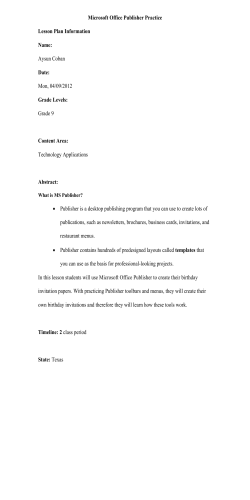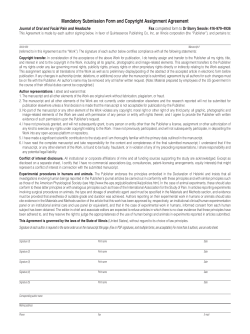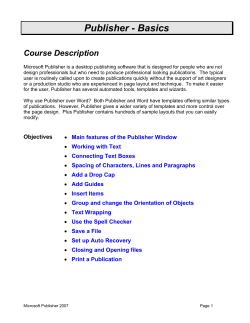
THE SCORE... No. 2 Music Publishing
THE SCORE... No. 2 _______________________________________________________________________________ Music Publishing The first music publisher was solely the producer of printed music. Today, the publisher is a representative of the music writer and is concerned with all forms of exploitation of the copyrights in their compositions, with printed music now representing approximately 10% of total publishing revenues. Music Writers and Copyright As a composition is made up of a literary and a musical work, copyright law protects it1. The music writer is the first owner of the copyright in a composition2. This means they can restrict or prevent the following from being done to their composition3: > Copying > Issuing copies > Renting > Performing > Broadcasting > Adapting It is these rights that a music writer assigns or licenses to a publisher to exploit4. The Promotional Role of a Music Publisher The most common ways in which a publisher exploits a music writer’s work are: > By securing recordings of the material > By securing its use on television and in film (synchronisation) > By pushing for its performance > By securing the production of printed music The publisher establishes an income from this exploitation by licensing the use. With the exception of printed music, licensing can be done in conjunction with a collection society. The income gained from the licensing of copyright material, such as a composition, is called a royalty. The three main sources of royalty revenue are: > Mechanical licences – for the physical copying of a composition > Performance licences – for the public performance or broadcast of a composition > Synchronisation licences – for the use of a composition with visual images Today, mechanical and performance licences are usually issued on behalf of publishers and music writers by collection societies. This is also true where synchronisation licences are concerned but to a lesser extent. Collection societies will collect and distribute the royalties received to the publisher and music writer. (For further information on collection societies, please see THE SCORE... No.1: Make Your Music Pay) The Administrative Role of a Music Publisher The involvement of the collection societies in the licensing of rights, and the collection and distribution of royalties, has led to the administrative role of the publisher becoming: > Joining the collection societies5 > Registering compositions with the collection societies > Accounting to the music writer the royalty income 1 2 3 4 5 CDPA 1988 Section 1 (1) CDPA 1988 Section 11 (1) CDPA 1988 Section 16 (1) Subject to the performing rights that the music writer may have already assigned to the PRS Music writers contracted to publishers do not need to join MCPS because their publisher collects their royalties THE SCORE... Music Publishing Page 2 _______________________________________________________________________________ Once the publisher and music writer receive their royalties from the collection societies, how they share the royalty income is dictated by the music publishing agreement. However, if the income is coming in via a collection society there will be an administration fee deducted. Also, PRS requires that at least 50% of performance licence income go directly to the music writer. The Creative Role of a Music Publisher Unlike the promotional and administrative roles of the publisher, the creative role concerns the publisher’s relationship with the music writer, rather than their compositions. This role is the nurturing and development of a music writer’s talent. For music writers new to the industry the publisher is the gatekeeper and director of their musical careers. The publisher may initially take on the traditional role of other music industry figures, such as managers and record companies by: > Organising time in the recording studio > Creating promotional material > Organising live performances > Building a creative team around the music writer - Co-writer - Arranger - Band - Producer Being involved from an early stage in the music writer’s career can also financially benefit the publisher because usually they take a higher share of the royalties due to the extra responsibilities they commit to. Publishers in Different Genres Music publishers come in a variety of different guises, from pop to classical. It is important for a music writer to be represented by a publisher that specialises in their genre and to know how that publisher is likely to exploit their rights. Approximate perentages for the major sources of revenue for music publishers are given below: Pop: Mechanical royalties for recorded use of music Live performances and broadcasting Synchronisation fees for music in commercials and films Other uses (online, mobile ring tones, printed music) 40% 36% 14% 10% Classical: Sales of printed music Live performances and broadcasting Hire fees Grand Rights fees for the use of music in theatrical performance Mechanical royalties for recorded use of music Synchronisation fees for music in commercials, films and other uses (online etc) 50% 15% 12% 10% 8% 5% Printed Music The sale of printed music now accounts for approximately 10% of the turnover of the publishing industry and is worth about £42m a year. Printed music is still a core part of the business of classical publishers, who generally keep the printing under their own control. It is the cost of producing printed music that classical publishers give as the reason they need to retain the copyright in works longer than pop publishers – life of copyright compared with between 12 and 15 years. In the pop business, generally only the hit songs are printed and therefore are usually sub-licensed to one of the main print publishers – for example, Music Sales or Faber Music. Publishing Agreements (BASCA would always advise members to read publishing contracts very carefully, to make sure that the terms and THE SCORE... Music Publishing Page 3 _______________________________________________________________________________ percentages they are being offered are fair. If you are offered a publishing contract, we would always urge you to make use of our pro bono legal service. This service allows you to have your contract checked over by an approved industry lawyer, who will flag up any areas for concern. To use the service, call 020 7636 2929 or email info@basca. org.uk) Single Song Agreements: With a single song agreement a music writer only assigns one composition to a publisher to exploit. Under this type of agreement a publisher will fulfil both the promotional and administrative roles of a music publisher. A publisher will not necessarily fulfil the creative role due to limited relationship this type of agreement requires the music writer and publisher to have. Common features of a single song agreement are: > Rights are assigned rather than licensed > Retention period of life of copyright or shorter > There maybe an advance but it is likely to be small > Publisher will receive approximately 20-25% of gross income The single song agreement would be ideal for a music writer who only writes a small, irregular number of works, or one who wants to be free to self-publish or publish their works through a variety of different publishers. Exclusive Songwriters Agreements: With an exclusive songwriters agreement the music writer is agreeing that the publisher will own and control all the works they compose during the term of that agreement. Common features of an exclusive songwriters agreement are: > Rights are assigned rather than licensed > Retention period of 12-15 years > Term of 3-5 contract periods > Usually an advance, size of which is dependant on bargaining power > Publisher will receive approximately 20-25% of gross income The exclusive songwriters agreement is the only agreement that incorporates all three roles of a music publisher: promotional; administrative; and creative. This indicates the time, money and commitment a publisher is looking to support the music writer with. However, the exclusive songwriters agreement is a restraint of trade and therefore before signing up to such a contract the music writer must be sure that it is in their best interest to do so. Administration Agreements: With an administration agreement the music writer licenses a publisher to administrate the copyright in their compositions on their behalf. Common features of an administration agreement are: > Rights are licensed rather than assigned > Term of 3-5 contract periods > Not usually an advance > Publisher will receive approximately 10-15% of gross income With an administration agreement the publisher will only undertake the administrative role of a music publisher. This type of deal is ideal for a music writer who doesn’t need their works promoted, perhaps because the works will generate income without any promotion, but it is not in their interest to self-publish. Sub-publishing Agreements: With a sub-publishing agreement the copyright owner sub-licenses their rights to a publisher. The sub-publisher will fulfil both the promotional and administrative roles of a music publisher. Common features of a sub-publishing agreement are: > Rights are licensed rather than assigned > Term of 3-5 contract periods > Payment of an advance is dependant on bargaining power > Publisher will receive approximately 15-20% of gross income A sub-publishing deal is usually done in two situations. Firstly, by established music writers who want to retain their copyrights but want a publisher to do more than administrate their works. Secondly, by publishers who do not operate overseas and therefore license publishers in foreign markets to exploit their copyrights on their behalf. THE SCORE... Music Publishing Page 4 _______________________________________________________________________________ Self-publishing To self-publish is to represent yourself where the exploitation of the copyrights in your compositions is concerned, rather than giving this responsibility to anyone else. Reasons to self-publish: > 100% of any income is your own > You can more easily control any uses of your work > If your work is already being performed, recorded or synchronised for commercial purposes, then you are already due royalties > If you are a performer as well as a music writer, you can generate performance income for yourself by performing your own work > You can join both PRS for Music and MCPS without a publisher and therefore it is possible for you to administrate your own works (subject to meeting certain criteria) Reasons not to self-publish: > Whether your work is already being exploited without a publisher or not, a good publisher will always have the network and skills to increase its use > If you are not a performer yourself, it is hard to generate performance income without someone promoting your work for you > A good publisher will be able to more efficiently chase those international royalties which slip the net of the collection societies > For an up and coming music writer, eventually the administration required to publish your work will interfere with your music writing – at this point, employing the services of a publisher is advisable Finding a Publisher Firstly, create a high-quality demo of your work, then research which publishers you wish to contact. The Music Publishers Association website (www.mpaonline.org.uk) has a directory of members and highlights those publishers in each genre who will accept unsolicited demos. You should also visit your local record shop and look at the sleevenotes on music for sale to discover which publishers are attracted to your style of music. Call the publishers in advance and ask who is responsible for A&R or Creative within the company, then send your demo to the appropriate contact at the publishers. Send a maximum of 5 compositions and make sure that you enclose enough information about yourself: website; myspace; contact number; and e-mail You might not hear from some publishers after you have sent material for a few weeks. Don’t be put off by this, and always follow up with a call/e-mail after a couple of weeks. It might be that they haven’t got round to listening to your material yet. Helpful links: MPA – Music Publishers’ Association www.mpaonline.org.uk Membership organisation and trade association representing music publishers. Their website includes a directory of their members, and allows you to search for publishers by specialist genres or to filter out those publishers who are prepared to accept unsolicited material. MCPS – Mechanical-Copyright Protection Society www.prsformusic.com UK collection society for licensing and royalty distribution of recorded compositions. PRS for Music www.prsformusic.com UK collection society for licensing and distribution of publicly performed compositions. © BASCA 2009
© Copyright 2026











